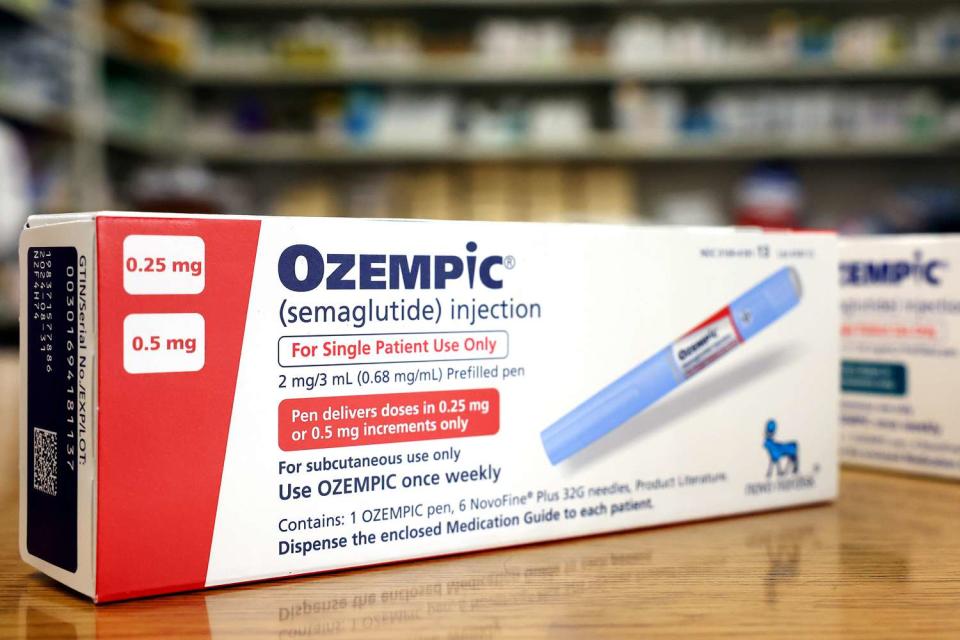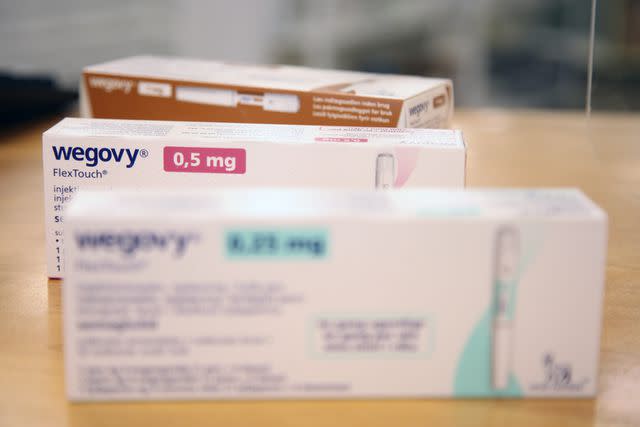Ozempic and Wegovy May Cause Stomach Paralysis in Some Patients
- Oops!Something went wrong.Please try again later.
A key ingredient in the diabetes drug Ozempic and weight loss drug Wegovy may cause the stomach to slow digestion to a dangerous point, doctors say

Mario Tama/Getty
A key ingredient in Ozempic is coming under fire for slowing digestion to a dangerous point.Drugs like Ozempic and Wegovy may cause severe gastroparesis — or stomach paralysis — by slowing down the process of digestion to a harmful point.
Some doctors are raising the alarm after patients taking the drugs for diabetes and weight loss were diagnosed with the condition, according to a report in CNN. The outlet also said the U.S. Food and Drug Administration has received similar reports.
Semaglutide and liraglutide — the key ingredients in Ozempic, Wegovy and other similar drugs — are GLP-1 receptor agonists, which can delay food digestion if taken for extended periods of time.
Toronto teacher Emily Wright, 38, told CNN she was diagnosed with stomach paralysis, which she said her doctors think is from Ozempic. She started taking the drug in 2018.

Steffen Trumpf/picture alliance/Getty
Wegovy contains the same ingredient, semaglutide, that's come under fire for reportedly slowing digestion to a dangerous point.Never miss a story — sign up for PEOPLE's free daily newsletter to stay up-to-date on the best of what PEOPLE has to offer, from juicy celebrity news to compelling human-interest stories.
And although she said she’s been off the drug for a year, Wright says, “I’m still not back to my normal,” and vomits so frequently that she’s had to take a leave of absence from her job.
Joanie Knight, 37, was also diagnosed with stomach paralysis after taking Ozempic. The Angie, Louisiana, woman told CNN: “I wish I never touched it. I wish I’d never heard of it in my life.”
“This medicine made my life hell. So much hell. It has cost me money. It cost me a lot of stress; it cost me days and nights and trips with my family. It’s cost me a lot, and it’s not worth it,” she said. “The price is too high.”
Dallas resident Brenda Allen, 42, had similar symptoms after taking Wegovy, and although she tells CNN she doesn’t have a diagnosis yet for her stomach issues — which included vomiting so severely she landed in urgent care with dehydration — her symptoms didn’t begin until she started taking the weight-loss drug.
This isn’t the first time these drugs have come under fire for these potential side effects.
Earlier this month, the American Society of Anesthesiologists warned that people should stop taking these drugs before surgery, because they were finding that patients still had food in their stomachs on the operating table — even if they had fasted before the procedure.
The reason, again, was slower digestion from longtime use of the drugs — which put the patients at risk of “regurgitation and pulmonary aspiration.”
A big problem, Dr. Michael Champeau, ASA president and adjunct clinical professor at Stanford University, told Health, is that because these drugs are still relatively new, “they haven’t done studies on how long it actually takes for the stomach to be empty after taking a GLP-1 agonist, so there are a lot of areas where we might be able to give more precise guidance if we have more science.”
Related: Stars Who've Spoken About Ozempic — and What They've Said
Manufacturer Novo Nordisk acknowledged the concerns in a statement.
"Semaglutide has been extensively examined in robust clinical development programs, large real world evidence studies and has cumulatively over 9.5 million patient years of exposure,” a spokesperson for the company said in a statement to The Independent.
“Gastrointestinal (GI) events are well-known side effects of the GLP-1 class. For semaglutide, the majority of GI side effects are mild to moderate in severity and of short duration. GLP-1’s are known to cause a delay in gastric emptying, as noted in the label of each of our GLP-1 RA medications. Symptoms of delayed gastric emptying, nausea and vomiting are listed as side effects.”
For more People news, make sure to sign up for our newsletter!
Read the original article on People.

